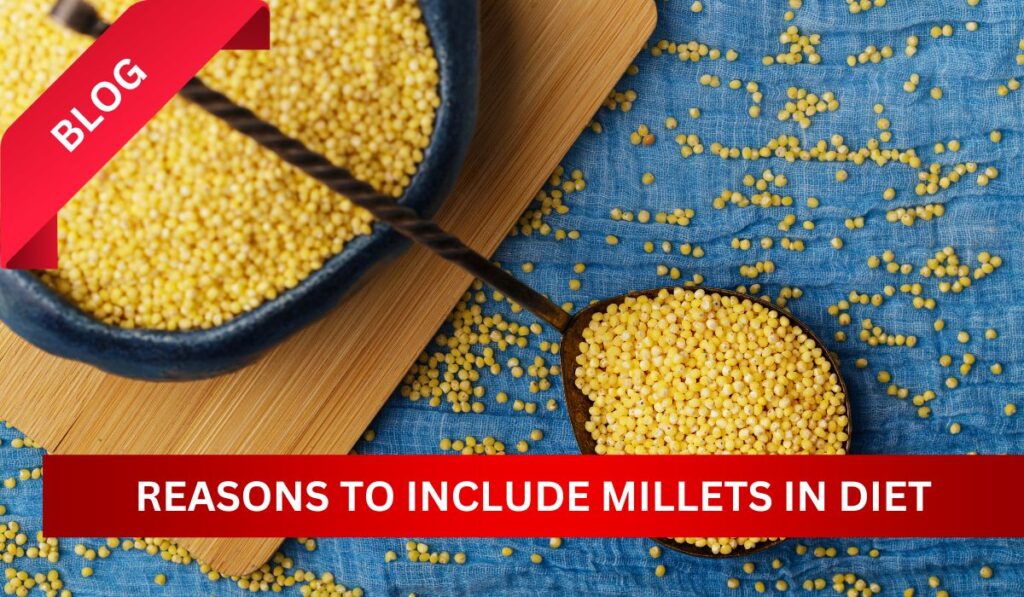Introduction: In recent years, millets have gained popularity as a nutritious and versatile grain option. These small-seeded grains have been a staple in many traditional diets around the world for centuries. Packed with essential nutrients and offering a range of health benefits, millets are a great addition to your daily diet. In this blog post, we will explore five compelling reasons why you should consider including millets in your regular meals.
Nutritional Powerhouse: Millets are rich in nutrients, making them an excellent addition to a balanced diet. They are a good source of dietary fiber, which aids digestion, promotes satiety, and supports weight management. Millets also contain essential minerals like iron, magnesium, phosphorus, and potassium, which are vital for maintaining overall health. Additionally, millets are gluten-free, making them suitable for those with gluten sensitivities or celiac disease.
Promotes Heart Health: Consuming millets can have a positive impact on cardiovascular health. These grains contain a high amount of soluble fiber, which helps lower cholesterol levels and reduces the risk of heart disease. The presence of magnesium in millets is also beneficial as it helps relax blood vessels, promoting better blood flow and reducing the risk of hypertension and stroke.
Manages Blood Sugar Levels: For individuals with diabetes or those looking to maintain stable blood sugar levels, millets can be an excellent choice. Millets have a low glycemic index, meaning they cause a slow and steady rise in blood sugar levels compared to refined grains. This property helps regulate insulin production and prevents sudden spikes and crashes in blood sugar. Including millets in your diet can contribute to better glycemic control and overall diabetes management.
Supports Weight Management: Millets are a great ally in weight management efforts. With their high fiber content, millets provide a feeling of fullness, reducing hunger pangs and preventing overeating. The complex carbohydrates found in millets are slowly digested, providing sustained energy and helping to control cravings. Additionally, millets have a lower calorie content compared to rice or wheat, making them a healthier option for those aiming to shed excess pounds.
Boosts Digestive Health: Maintaining a healthy digestive system is crucial for overall well-being, and millets can play a significant role in achieving that. The fiber content in millets promotes regular bowel movements, prevents constipation, and supports a healthy gut microbiome. The presence of prebiotic properties in millets nourishes beneficial gut bacteria, enhancing digestion and nutrient absorption.
Incorporating Millets into Your Diet: Now that we understand the benefits of millets, here are some easy ways to include them in your daily diet:
a. Replace rice or wheat: Substitute millets like foxtail millet, finger millet (ragi), or pearl millet for rice or wheat in dishes such as pulao, biryani, or roti.
b. Breakfast options: Enjoy millet-based breakfast porridge or pancakes for a nutritious start to your day.
c. Millet salads: Use cooked millets as a base for salads, adding vegetables, herbs, and a flavorful dressing.
d. Millet snacks: Prepare millet-based snacks like crispy baked millet chips or roasted millet mixture (chivda).
e. Millet desserts: Explore millet-based dessert recipes such as millet kheer (pudding) or millet energy bars.
Conclusion: Millets are a treasure trove of nutrition and offer numerous health benefits. Incorporating millets into your daily diet can provide essential nutrients, support heart health, aid in managing blood sugar levels, assist with weight management, and promote a healthy digestive system. With their versatility

